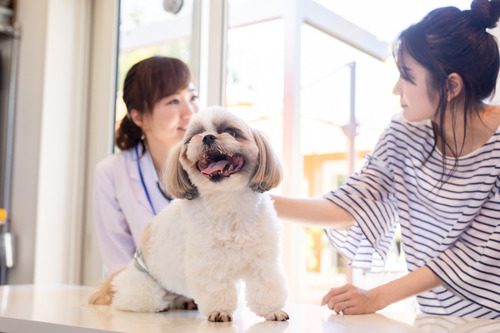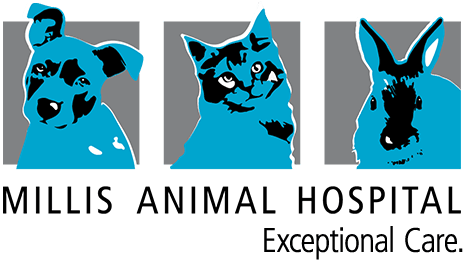When a dog bite occurs, it can be a frightening and stressful experience for both you and your pet. Understanding what to do if your dog gets bit by another dog is crucial to ensuring their safety and well-being. In this blog, we’ll explore the steps you should take to address a dog bite, how to prevent future incidents, and the importance of veterinary care. If your dog has been bitten and you need immediate assistance, contact Millis Animal Hospital in Millis, MA, at 508-376-5317.

Assessing the Situation and Immediate Steps
When your dog is bitten by another dog, the first moments are critical. Remaining calm and taking quick action can make a significant difference in the outcome.
Check for Injuries
Begin by carefully examining your dog for any visible injuries. Look for puncture wounds, lacerations, or bruising. Even if the injuries appear minor, remember that dog bites can cause internal damage that isn’t immediately visible. Pay attention to your dog’s behavior; if they are limping, whimpering, or showing signs of distress, there may be underlying injuries.
Separate the Dogs Safely
If the aggressive dog is still nearby, ensure both dogs are safely separated to prevent further attacks. Use a calm and firm voice, and avoid physically intervening if it puts you at risk. If necessary, seek help from others nearby to restrain the dogs.
Stay Calm and Offer Comfort
Your dog will likely be scared and in pain. Stay as calm as possible to avoid escalating their anxiety. Speak to them in a soothing tone and avoid sudden movements. Your presence and calm demeanor will help your dog feel more secure during this stressful time.
Contacting Your Veterinarian
Professional veterinary care is essential following a dog bite. Even if the wound seems minor, an evaluation by a veterinarian is necessary to prevent infection and address any underlying injuries.
Schedule an Immediate Appointment
Call Millis Animal Hospital at 508-376-5317 as soon as possible to schedule an emergency appointment. Inform the staff about the bite incident and describe your dog’s condition to ensure they receive prompt care.
Provide Necessary Information
When speaking with the veterinary team, provide detailed information about the incident. Mention the size and breed of the other dog, the location and severity of the bite, and any behavioral changes in your dog. This information will help the veterinarian assess the risk of infection and decide on the best course of treatment.
Follow Veterinary Advice
Once at the clinic, follow the veterinarian’s recommendations closely. They may clean the wound, administer antibiotics, and provide pain relief. They will also check for signs of infection and other complications that may require further treatment.
Preventing Future Dog Bite Incidents
While it’s impossible to predict every potential encounter, there are steps you can take to minimize the risk of future dog bite incidents.
- Socialize Your Dog: Proper socialization is key to preventing aggressive encounters. Introduce your dog to various environments, people, and other dogs from a young age. Controlled and positive interactions help reduce fear and aggression.
- Recognize Warning Signs: Understanding canine body language can prevent many bite incidents. Learn to recognize signs of aggression, such as growling, baring teeth, and stiff body posture. If you notice these signs, remove your dog from the situation calmly and safely.
- Use Leashes and Supervision: When in public places, always keep your dog on a leash and under your control. Supervise interactions with other dogs, especially in unfamiliar environments. A leash provides a physical way to separate dogs if an encounter becomes aggressive.
- Consult a Professional Trainer: If your dog exhibits aggressive behavior, seek help from a professional dog trainer or behaviorist. They can provide tailored strategies to manage and reduce aggression, improving your dog’s overall behavior.
Recognizing and Treating Infections Due to Dog Bites
Dog bites can lead to infections due to bacteria in the mouth. Recognizing the signs of infection and seeking timely treatment is crucial.
Signs of Infection
Monitor the bite wound closely for signs of infection. These may include redness, swelling, pus, and a foul odor. If your dog develops a fever, becomes lethargic, or shows increased pain at the bite site, contact your veterinarian immediately.
Follow Post-Bite Care Instructions
Your veterinarian will provide specific instructions for wound care. Follow these diligently, including any prescribed medications. Keeping the wound clean and monitoring it regularly will help prevent infections.
Revisit the Veterinarian
Schedule follow-up appointments to ensure the wound is healing properly. Your veterinarian may need to recheck the bite site and adjust treatment if necessary.
The Importance of Reporting the Incident
Reporting the dog bite incident to local authorities is an important step in addressing and preventing future incidents.
Contact Animal Control
Notify your local animal control agency about the dog bite. They will document the incident and may take further action if the aggressive dog poses a continued threat to others.
Gather Witness Statements
If there were witnesses to the incident, gather their contact information and statements. This information can be valuable for animal control and your veterinarian.
Understand Local Laws
Familiarize yourself with local laws regarding dog bites and owner responsibilities. Knowing your rights and obligations can help you navigate the aftermath of the incident more effectively.
Caring for Your Dog’s Emotional Well-being
A dog bite can be a traumatic experience for your pet. Addressing their emotional well-being is as important as treating their physical injuries.
Provide a Safe Environment
Create a calm and secure space for your dog to recover. Reduce exposure to stressful situations and allow them to rest and heal in a quiet area.
Monitor Behavioral Changes
Observe your dog for any changes in behavior following the bite incident. Increased fear, aggression, or anxiety may indicate trauma. If these changes persist, consult your veterinarian or a professional behaviorist.
Offer Positive Reinforcement
Use positive reinforcement techniques to rebuild your dog’s confidence. Reward calm behavior and gradually reintroduce them to social interactions in a controlled manner.
When to Seek Emergency Veterinary Care
Knowing when to seek emergency veterinary care can make a significant difference in your dog’s recovery. Seek immediate veterinary attention if your dog displays severe symptoms such as uncontrollable bleeding, deep puncture wounds, breathing difficulties, or signs of shock. These symptoms require urgent medical intervention. After the initial emergency care, follow up with your veterinarian to ensure your dog’s recovery is on track. Regular check-ups and adherence to treatment plans are essential for full recovery.
Helping Your Dog Recover and Thrive
Recovering from a dog bite involves both physical and emotional healing. Supporting your dog through this process will help them return to their happy, healthy self.
- Adhering to the Treatment Plan: Follow your veterinarian’s treatment plan closely, including administering medications and attending follow-up appointments. Consistency in care is crucial for a full recovery.
- Providing Emotional Support: Your dog will need plenty of love and reassurance during their recovery. Spend quality time with them, engage in gentle activities, and provide comfort to help them feel secure.
- Rebuilding Confidence: Gradually reintroduce your dog to social interactions once they are physically healed. Use positive reinforcement and create positive experiences to rebuild their confidence and reduce fear.
Supporting Your Dog’s Recovery After a Bite Incident
If your dog has been bitten and requires immediate care, call Millis Animal Hospital at 508-376-5317. Our dedicated team is here to provide the care and attention your pet needs to recover fully. We understand the stress and worry that comes with such incidents, and we’re committed to offering compassionate support throughout your dog’s healing process. With our expertise and resources, we’ll help manage your dog’s pain, prevent infections, and address any trauma they may have experienced. Reach out to Millis Animal Hospital today for the professional care your dog deserves.
Recent Posts
About Us
Millis Animal Hospital is a privately owned AAHA-accredited, Cat-Friendly Certified practice staffed with Fear Free Certified professionals. We know a thing or two about treating pets and their families the way they deserve, with excellent preventive care and surgical services tailored to your individual needs.
